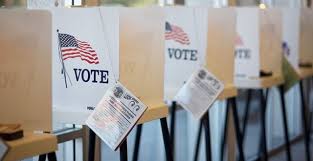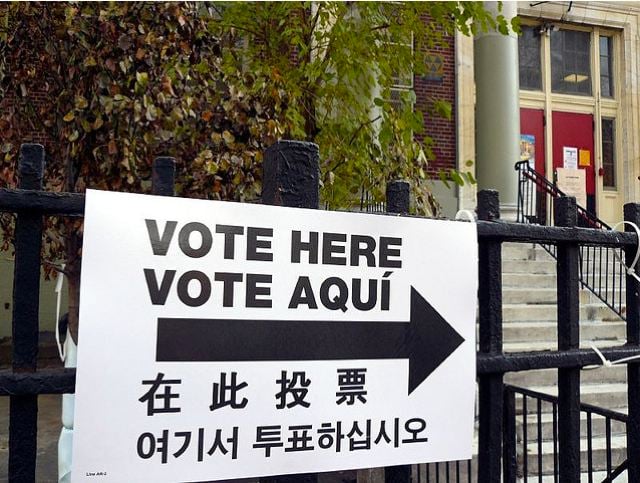New York Voters Sue the State, Claiming Mass Voter Roll Purges

Dozens of New York voters are suing the state, saying that their voter registration changed without their input, costing them the ability to vote in Tuesday’s primary. The lawsuit, filed this afternoon in Long Island federal court by the group Election Justice USA, argues that the voters’ alleged registration changes deny them equal protection under the constitution, and demands a blanket order allowing “tens of thousands” of potential plaintiffs to vote in tomorrow’s presidential primary.
“Plaintiffs are in imminent harm of losing their right to vote,” the suit reads. “They have beseeched the various Boards of Elections without result. Nothing can save their right to vote save an order from this Court.”
New York’s primaries are closed, meaning only members of a given party can vote in that party’s primary, and the deadline to change parties is more than six months before Primary Day, the earliest in the country. Those who signed onto the lawsuit say that their paperwork was in order, and in many cases they had voted repeatedly in Democratic primaries from the same address, but that recent checks of their voter registrations revealed that their party had been changed or could not be found at all. The accounts echo online reports of other spurned would-be voters.
“We were seeing an alarming number of voter affiliations changed without people’s knowledge or consent, people who were registered listed as not registered,” said Shyla Nelson, a spokeswoman for Election Justice USA.
As the primary neared and the group solicited accounts of irregularities, reports poured in, she said: “What started as a trickle is now a river.”
More than 200 voters signed onto the lawsuit, Nelson said on Friday (she was still tallying late additions this afternoon as lawyers pushed up against the close-of-court deadline).
One plaintiff, a 24-year-old from Suffolk County, says that he registered as a Democrat in 2009, and that a change of affiliation form the BOE showed him, supposedly proving he left the party, bears a signature that is an “identical, pixel-by-pixel” copy of the signature on his driver’s license. Another plaintiff, a 58-year-old from upstate Onondaga County, had been registered as a Democrat since 1989, but on April 11th found that her registration was “purged.” An employee of the county told her that the change was a clerical error, but that she would not be able to vote on Tuesday, according to the suit. Others named in the lawsuit registered for the first time within days of the new voter deadline in March, or the party-change deadline last October.
Nelson, a Vermont performance artist, described Election Justice as nonpartisan, though she and several other core members identified on its website are vocal supporters of Vermont Senator Bernie Sanders. Most of the complaints we’ve seen publicized online center around spurned voters seeking to cast a ballot for Sanders in tomorrow’s Democratic primary. In recent days, the state Board of Elections has chalked up concerns such as these to voter ignorance of New York’s restrictive rules, and of the occasional data entry error.
Election Justice USA formed recently after Republican officials in Arizona’s Maricopa County drastically reduced the number of polling places for the state’s March primary, leading to lines as much as five hours long, with the worst impacts in majority-Latino districts.
“We wanted to develop a response to voter suppression, issues at polling—the widespread problem at polls this election cycle,” Nelson said.
In New York, voters certain that they should be registered Democrat have in many cases been unable to affirmatively prove their status. In one such case, Long Island resident Jonathan Carrillo, a DJ, said that he registered as a Democrat for the first time in March, but that he was listed in Board of Elections records as a Republican. Consultation with Nassau County election officials brought up a 2013 DMV form that shows he registered as a Republican when getting a license, which he says he never would have done.
In this situation, Carrillo’s only remaining option is to go to the county Board of Elections office on Primary Day and explain his case to a judge, in hopes of getting a court order to allow him to vote. This is unfair, Election Justice argues.
“The Board of Elections, not voters, holds the voting records and should be responsible to prove a voter’s ineligibility, rather than putting this burden on the voter. As it is currently structured, the statute places an onerous and excessive burden on the voter to prove their eligibility,”
said Blaire Fellows, one of the New York attorneys filing the suit. “It requires securing a court order, which takes time that many New Yorkers simply don’t have, as it means loss of income over and above what they lose by simply taking time off to vote.”
The other procedure available to voters with irregular registration records is to vote at a polling site using a provisional ballot, wherein one explains the nature of the irregularity, for commissioners to consider when they’re counting votes. This process, the lawsuit says, is the product of “one of the nation’s most opaque and oppressive voter laws.”
The suit asks for the state to preserve all provisional ballots and create a hearing process where voters can explain irregularities, adding a layer of due process, where currently, lawyers argue, the ballots are “discarded by the Board of Elections in a closed room.” What the lawsuit calls “purges,” its authors argue, disproportionately affect Hispanic, African-American, and Hispanic voters, as have previous electoral manipulations in the state’s history. The legal filing, which shows signs of being assembled in extreme haste, also cites the just-reported decline of registered Democrats in Brooklyn by 63,500, voters it also calls “purged.”
One Brooklyn resident recounts registering as a new voter last month and, upon being unable to find her registration, calling the Brooklyn BOE only to be told it was probably lost in the mail. Photojournalist Natalie Keyssar said she registered by mail within 48 hours of the March 25th deadline for forms to be postmarked, and that when she returned from an assignment in Mexico on Friday, she looked online to see where to vote, but found she is not registered. Repeated calls to the county board didn’t go through, and after an hour of trying again today, she said she reached a Ms. Jackson who told her that she “shouldn’t have left it till so close to the deadline,” that the office was receiving some 2,000 forms a day towards the end, and that her record can’t be found, likely because it hasn’t been processed yet.
“How can the U.S. actually tell its citizens their right to vote has been lost in the mail?” she wrote in a Facebook post.
She said she found it even more “shocking” when several friends reached out to say that they were having similar problems. “That’s just 8 of my random friends who just happen to be looking at Facebook, so this problem must be very widespread,” she said.
A call to the state BOE left her unsatisfied.
“What I’m waiting to hear is someone to take responsibility, to say that I did everything correctly and I’m still not a registered voter,” she said. “I have a U.S. passport, a driver’s license, a Global Entry photo ID, and an NYPD press pass—I am who I say I am. I just want to vote.”
Sanders bemoaned the closed primary setup in a recent speech.
“We have a system here in New York where independents can’t get involved in the Democratic primary, where young people who have not previously registered and want to register today just can’t do it,” Sanders said during his recent 27,000-strong rally in Washington Square Park.
Republican candidate Donald Trump has also bumped up against New York’s tight limits, as his children Eric and Ivanka just straight-up missed the deadline to register, and thus can’t vote for him. A state BOE spokesman has said that Trump supporters are also among those who have inundated his office with complaints.
An open primary would mostly eliminate the need to prove party affiliation in the first place, as Republicans would be able to vote in Democratic primaries and vice versa (and of course, Conservative, Green, and Working Families party members could vote outside their respective sandboxes).
In the 1970s, a group of New Yorkers sued to have the state’s early party-change deadline declared unconstitutional, but after two courts agreed with them, the Supreme Court overturned the decisions in a five to four ruling. In 2003, New York City’s independent/Republican mayor Michael Bloomberg pushed a ballot proposal to create nonpartisan primaries for city positions, in which the top two vote recipients would go on to the general election. Voters rejected this idea.
A bill currently before the Assembly would open up the presidential primary to those who are not members of a party. It is laid over in the election law committee, and if past efforts to expand voter access in New York are a guide, it may never see the light of day.
A state Board of Elections spokesman declined to comment, saying his office has not yet been served.
A hearing on the suit is set for 9 a.m. Tuesday.
For more information on voting in the Tuesday presidential primary, see our guide here.


